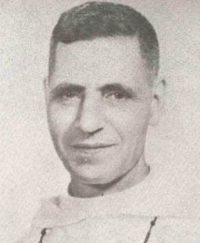We would frequently meet soldiers who say, “I am Spanish.” Curious as to how there could be Zamorans in the U.S. Army we asked one of them:
“From what province are you?”
“From California”. And he explained, “My father was Spanish and my mother Mexican, and I am an American citizen. We’ve just arrived and we feel like talking in Spanish. Tomorrow we might be dumped into another place where there are Japanese still remaining.”
They took pride in talking about their countrymen, and we enjoyed listening to their sweet accent and diction, their picturesque expression and their language interspersed with hispanized English words.
We came across some authentic Spanish who told us he was from Sevilla or from León or from Valencia. There was even one who insisted in referring to himself as an “Asturian from Texas”.
“In the Army” one officer told us, “there are no socialists nor communists as there are no Democrats or Republicans.” Among the Mexicans with whom we chatted, there are no partisans — Toledans or pro-Tolstoy or pro-Stalin. They are all good Catholics.
Also with the expeditionary forces were thousands of Filipinos who were connected with the auxiliary services. Fighting in the first lines were the locally enlisted Filipinos, especially the guerrillas who served as links to the American forces. They are excellent combatants. Unfortunately, though, many dissident elements in Tarlac and Pampanga would pass as guerrillas and they would attack the Americans. The Army, unable to distinguish the grain from the thistle, had to dissolve all groups — Sakdalistas and genuine guerrillas alike, confiscating all arms until they could clear the area and pick out the marauders from the same elements. The communist threat is real and is transcendental.
As long as the Army is in control, they will be able to keep the different dissident groups in check. But the day the politicians return to power, the political leaders of Moscow and Tokyo will be back to fish in the confused river of politics. We know who’s winning in war. But who’s going to win in peace?
Wars can be won by force of arms; peace can be gained only by justice — justice tempered with charity. To win in the grand final battle there is a need for men, organization, equipment and supplies. To win the peace, all these are needed, directed by the powers of the spirit. The course and recourse of these faculties is charity. I do not know of any other antidote to hatred than love, nor any other antidote to avarice, pride and ambition than charity!
If hatred is to win the war, what kind of peace shall we expect? Were the millions of lives lost sacrificed to this end?
“I don’t mind losing my life”, an officer told me a few days ago, “but I would certainly want to lose it for a noble cause.”
What these soldiers have to contend with is not Germany or Japan, both of which have already been defeated, but Russia or, if we might personify, Stalin.
